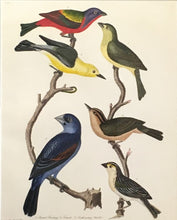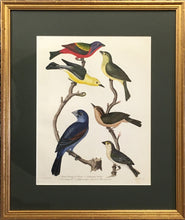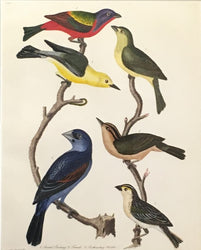Alexander Wilson. Plate 24. “Painted Bunting/Female/Prothonotary Warbler/Wormeating Warbler/Yellow-winged Sparrow/Blue Grosbeak.”
From American Ornithology. New York & Philadelphia: Collins & Co. & Harrison Hall, 1829. Second edition. Folio. ca. 10 x 13 (plate mark). Engraving. Original hand coloring. Very good condition. Framed with UV filtering glass. A/A
Shadow from photographer on glass/matting.
Alexander Wilson is known as “the father of American ornithology.” He earned this title both because of his American Ornithology, which was the first natural history just on American birds, first issued between 1808 and 1814 and so predating Audubon by about two decades, and because he was the first American citizen to become a full-time scientist in this field. Wilson, a Scottish immigrant, drew most of the birds for his ornithology himself with the engraving mostly by Alexander Lawson and John G. Warnicke. Wilson was working with a small budget, and so had to crowd as many specimens as he could onto one plate for the series. Although he fell far short of his goal of depicting every species of bird in North America, his is a highly respected work in the history of science, and he was the leading competitor and chief precursor of Audubon. These are fine and important prints from the second edition of the first American ornithology.





